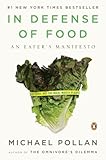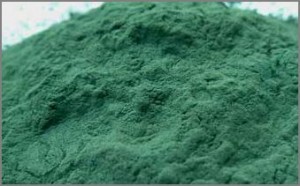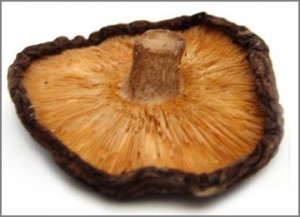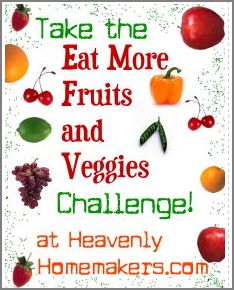 I recently completed In Defense of Food: An Eater’s Manifesto by Michael Pollan, and what a mind-boggling, insightful and enjoyable read it was. I read frequent quotes from the book to my husband and we were both astounded at how far the food industry has fallen in providing healthy nutritious food.
I recently completed In Defense of Food: An Eater’s Manifesto by Michael Pollan, and what a mind-boggling, insightful and enjoyable read it was. I read frequent quotes from the book to my husband and we were both astounded at how far the food industry has fallen in providing healthy nutritious food.
In just 200 pages, In Defense of Food gives you a guided tour of 20th century food science, a history of “nutritionism” in America and a glimpse into the union of government and the food industry. It provides the reader with very helpful step by step tips to guide them in food shopping.
“Nutritionism prefers to tinker with the Western Diet, adjusting the various nutrients (lowering the fat, boosting the protein) and fortifying processed foods rather than questioning their value in the first place.”
With the age of industrialization, we have more heart disease, obesity, and diabetes than any other period of time. And these diseases are only so common in Western societies. Why? Corn, soy, wheat and rice is the majority of what we are eating!
“Corn contributes 554 calories a day to America’s per capita food supply and soy another 257. Add wheat (768 calories) and rice (91) and you can see there isn’t a whole lot of room left in the American stomach for any other foods. Today these four crops account for two thirds of the calories we eat. When you consider that humankind has historically consumed some eighty thousand species, and that three thousand of these have been in widespread use, this represents a radical simplification of the human diet. Why should this concern us? Be humans are omnivores, we need somewhere between 50 and a 100 different chemical compounds and elements in order to be healthy. It’s hard to believe we’re getting everything we need from a diet consisting largely of processed corn, soybeans, rice, and wheat.” (page 117-118)
Why are we eating so much of these products? Because it grows fast, is cheap to grow, and the government pays farmers to grow corn and soy! Most of the corn and soy winds up in the feed of our food animals (and then we pump them up with antibiotics because they get sick on it), but the rest goes into processed foods. Thus it results in cheap food; unfortunately, food that is depleted in nutrients because it has grown too fast to get what it needs. Then it is processed and refined so that there are no living organisms in it that would cause it to spoil over the long distance that it must travel to get to the supermarket. People are more worried about what to eat then ever before. Health claims are smacked on every packaged food on the market. Is this really advancement? Americans now eat more calories resulting in being overfed and yet undernourished.
Food quality has declined since the introduction of industrialization with the depletion of soil nutrients from chemicals and pesticides. “To put this in more concrete terms, you now have to eat three apples to get the same amount of iron as you would have gotten from a single 1940 apple, and you’d have to eat several more slices of bread to get your recommended daily allowance of zinc than you would have a century ago.”
I love how this book doesn’t supply us with a new diet plan! It is just a gentle reminder to return to the way our ancestors ate. A more traditional, whole foods diet of REAL food. As Dr Weston Price discovered in his research studying the diets and health of various traditional cultures around the globe: “The human animal is adapted to, and apparently can thrive on, an extraordinary range of different diets, but the Western diet, however you define it, does not seem to be one of them.” It’s a new look at encouraging readers to avoid processed, packaged so called “food” and return to the basics: produce, dairy, real fat, whole grains and meat.
How do we find real food? Michael Pollan offers these helpful guidelines:
1. Don’t eat anything your great grandmother wouldn’t recognize as food.
2. Avoid food products containing ingredients that are A) Unfamiliar, B) Unpronounceable, C) More than five in number or that include D) High-Fructose Corn Syrup. The main idea here is if it has a package, there is a significant increase in the possibility that it is not really food. Always check those ingredient lists. Even “whole grain” products can just be a combination of refined and fortified ingredients with the addition of HFCS.
3. Avoid food products that make health claims.
“If you’re concerned about your health, you should probably avoid products that make health claims. Why? Because a health claim on a food product is a strong indication it’s not really food, and food is what you want to eat.”
4. Shop the peripheries of the supermarket and stay out of the middle. Processed foods dominate the center aisles, whereas whole foods can be found among the meat, dairy and produce.
5. Get out of the supermarket whenever possible. Find those local sources in farmer’s markets, CSAs, etc.
Overall, I highly recommend this read, if you overlook some of the evolutionary thought that jumps out here and there. If you are new to the whole foods way of eating, or even if you are like me and been on the journey for a few years, but don’t know all the history and truth behind it, this is a must read for all! It was very fascinating to me!







 One product that pretty much does it all for us! Coconut oil!
One product that pretty much does it all for us! Coconut oil!